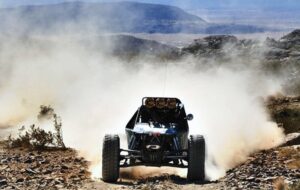Off-Roaders And Marines in Contention for Rugged Desert
 By Tony Perry, Los Angeles Times
By Tony Perry, Los Angeles Times
An estimated 200,000 people a year flock to the desert valley for recreational pursuits: hiking, camping, rock-hounding, star-gazing and a new sport called “geocaching,” a treasure hunt using GPS technology. Moviemakers use the desert floor for chase scenes.
But the valley has gained its greatest acclaim in recent years as an untamed, unregulated venue for off-road vehicles. Off-roaders take their Jeeps, motorcycles, dune buggies, ATVs, “rock crawlers” and other souped-up vehicles over, around and through the rills and hills and rocks.
The annual King of the Hammers race, billed as the toughest desert race in the nation, draws more than 20,000 participants and spectators.
“There’s not another place in the country where we could hold our race,” said Dave Cole, one of the race organizers. “This is our Daytona 500.”
The Marine Corps, whose Twentynine Palms base is directly adjacent to Johnson Valley, also likes the valley’s challenging terrain — for similar yet different reasons.
The Marine Corps would like to include the land inside the boundaries of its Air-Ground Combat Center as a training area for large-scale, live-fire exercises where three battalions could simultaneously practice assaulting a fixed location. The land is controlled by the federal Bureau of Land Management.
Johnson Valley would give the Marine Corps a large-scale training capability it lacks at any of its bases, according to Marine brass. Even in a budget-tightening season when other projects are being dropped or trimmed, the Marine Corps has allocated $60 million for the expansion project.
Gen. James Amos, the commandant, considers the expansion “absolutely essential to providing the requisite training area for preparing Marines to meet the challenges of the future security environment.”
The off-roaders look at the valley and see an exciting, irreplaceable place for their sport. Amos looks at the valley and sees a place to provide training that will enhance the “survivability” of Marines in combat.
The off-roaders and the merchants who depend on all the recreationalists are not going down without a fight. When the Marines opened up their expansion proposal for public review in May, more than 25,000 responses were received.
The Marines have offered a compromise: the heart of the Johnson Valley racing area would be available 10 months a year and closed for two months when a major exercise is planned.
But expansion skeptics feel that the dual-use idea would be withdrawn as soon as the first civilian wanders innocently or defiantly into the midst of Marine training or is hurt by ordnance left when the training is over.
The dispute features two sides that, philosophically, are aligned. Both believe in living life on the edge, facing down danger in the desert.
The Marine Corps sent a color guard to this year’s King of the Hammers. Off-duty Marines have their own desert racing team. And expansion opponents, many of them military veterans, feel a twinge at opposing the Marines during a time of war.
“It’s going to have a devastating effect on recreation,” said Ray Pessa, a Yucca Valley activist. “National defense comes first, and if they say they need it, so be it. But I’m not sure they’ve looked at all the alternatives.”
The Marines agree there are other expansion alternatives on the eastern and southern edges of the base but insist that none is as good as Johnson Valley on the west.
The final environmental impact statement is set for completion in early January. The Department of Navy’s decision on which, if any, alternative to select is scheduled for April, in time for the issue to be sent to Congress for inclusion in the defense appropriations bill.
Beyond the effect on off-roaders and business owners, Betty Munson, with the Johnson Valley Improvement Assn., sees a loss of the freedom that lures people to the austere and often blisteringly hot desert.
Category: Access Issues










